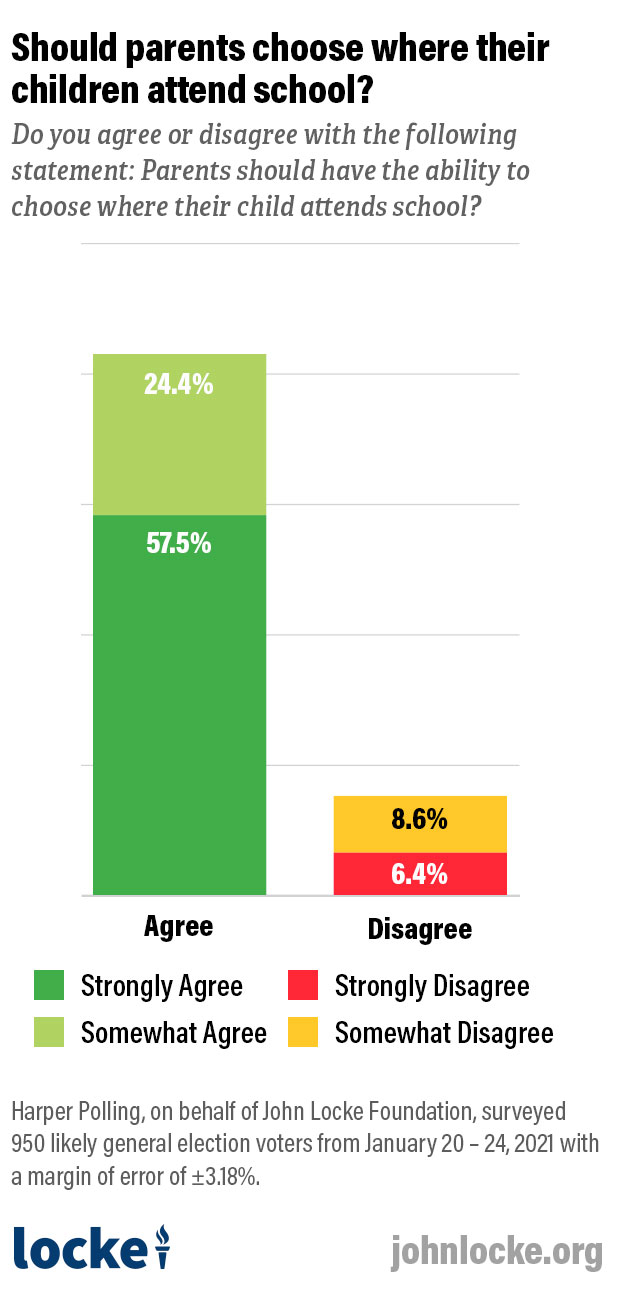Yes, even Democrats like the idea of school choice. A new Real Clear Opinion poll for the American Federation of Children shows overwhelming support for empowering parents by giving them choices for how and where their children are educated.
The poll found that support for school choice cuts across racial and even party lines, with 73% of white, 66% of black, 68% of Hispanic, and 66% of Asian voters in support. Seventy-five percent of Republicans favor school choice, compared to 69% of Democrats.
January’s Civitas Poll illustrated the strong support here in North Carolina. It’s no wonder. After a year of direct involvement with educating their kids — most likely in a home virtual environment — parents have a much better understanding that a one-size-fits-all approach is no longer viable. They’ve directly experienced challenges, aptitudes, social abilities, and more. Armed with this knowledge, they’re seeking what works best for their kids and their families. To that question, the Civitas poll also gave us a very interesting look into the which learning environments parents are drawn to.

Voters were also asked their view of the role a parent should play in choosing where their child attends school.The overwhelming majority – 82% – agree that parents should have that ability.
The findings come during National School Choice Week.
Only 32% of respondents said they would choose a traditional public school for their child if location and cost were not a factor, and just 7.5% gave their local public school an “A” grade.
With location and cost not a factor, two out of three respondents (65%) chose an alternative learning environment for their child: private religious or parochial school (23%), private non-religious school (20%), charter school (14%), and homeschool (8%). Even more – 72% – favor education savings accounts in K-12 education.
ESAs create a savings account using government funds for parents with restricted uses for educational purposes.
That 8 percent support for homeschooling (see above) may seem low, but North Carolina is a leader in home schools. In fact, the number of home-school families in North Carolina has nearly doubled, as Carolina Journal reported this week.
Nationwide, the number of homeschoolers doubled in 2020. Between April 25 and May 5, 2020, the Census reported 5.4% of all U.S. households with school-age children were homeschooling. That leapt to 11.1% of households by fall. In North Carolina, the increase was from 5% to 9.4%.
“It’s clear that in an unprecedented environment, families are seeking solutions that will reliably meet their health and safety needs, their child care needs and the learning and socio-emotional needs of their children,” wrote Census researchers Casey Eggleston and Jason Fields.
Locke Foundation President Donald Bryson put it best when he assessed the January Civitas Poll results.
“Fortunately, North Carolina has created an educational environment, particularly over the past 10 years, that allows families to access other educational options. Now we are seeing families move into schools of choice in numbers we’ve never seen before.”
While school choice is broadly popular, the entrenched status-quo education establishment sees parental empowerment as a threat. Case in point: our governor, Roy Cooper, wants to eliminate a key school choice option for low-income families. See for yourself below how Cooper’s policy will hurt the most vulnerable.
His proposed budget ends the NC Opportunity Scholarship Program, a popular scholarship for low-income, disproportionately minority, students to attend a K-12 school of their parent’s choice.
Locke will always be a voice for parents and kids, no matter who opposes them.



